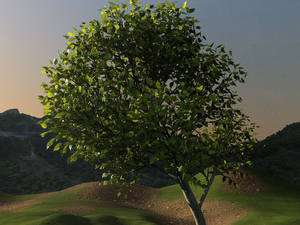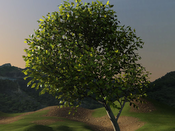Information
- Publication Type: Journal Paper with Conference Talk
- Workgroup(s)/Project(s):
- Date: March 2009
- Journal: Computer Graphics Forum (Proceedings EUROGRAPHICS 2009)
- Volume: 28
- Number: 2
- Location: Munich
- Lecturer: Ralf Habel
- ISSN: 0167-7055
- Event: EUROGRAPHICS 2009
- Conference date: 30. March 2009 – 3. April 2009
- Pages: 523 – 532
- Keywords: Animation, Physically Guided animation, Vegetation, Trees
Abstract
This paper presents a new method to animate the interaction of a tree with wind both realistically and in real time. The main idea is to combine statistical observations with physical properties in two major parts of tree animation. First, the interaction of a single branch with the forces applied to it is approximated by a novel efficient two step nonlinear deformation method, allowing arbitrary continuous deformations and circumventing the need to segment a branch to model its deformation behavior. Second, the interaction of wind with the dynamic system representing a tree is statistically modeled. By precomputing the response function of branches to turbulent wind in frequency space, the motion of a branch can be synthesized efficiently by sampling a 2D motion texture.Using a hierarchical form of vertex displacement, both methods can be combined in a single vertex shader, fully leveraging the power of modern GPUs to realistically animate thousands of branches and ten thousands of leaves at practically no cost.
Additional Files and Images
Weblinks
BibTeX
@article{Habel_09_PGT,
title = "Physically Guided Animation of Trees",
author = "Ralf Habel and Alexander Kusternig and Michael Wimmer",
year = "2009",
abstract = "This paper presents a new method to animate the interaction
of a tree with wind both realistically and in real time. The
main idea is to combine statistical observations with
physical properties in two major parts of tree animation.
First, the interaction of a single branch with the forces
applied to it is approximated by a novel efficient two step
nonlinear deformation method, allowing arbitrary continuous
deformations and circumventing the need to segment a branch
to model its deformation behavior. Second, the interaction
of wind with the dynamic system representing a tree is
statistically modeled. By precomputing the response function
of branches to turbulent wind in frequency space, the motion
of a branch can be synthesized efficiently by sampling a 2D
motion texture. Using a hierarchical form of vertex
displacement, both methods can be combined in a single
vertex shader, fully leveraging the power of modern GPUs to
realistically animate thousands of branches and ten
thousands of leaves at practically no cost.",
month = mar,
journal = "Computer Graphics Forum (Proceedings EUROGRAPHICS 2009)",
volume = "28",
number = "2",
issn = "0167-7055",
pages = "523--532",
keywords = "Animation, Physically Guided animation, Vegetation, Trees",
URL = "https://www.cg.tuwien.ac.at/research/publications/2009/Habel_09_PGT/",
}


 draft
draft

